Four Zambian Civil Society Leaders on Their Aspirations for the Summit for Democracy
“We need to maintain our democracy for ourselves and for the hope of others in the region”
USAID Administrator Samantha Power with Zambia President Hakainde Hichilema in Zambia. During the June 2022 visit, Power discussed the president’s reform agenda and how the United States can support the government as it works to advance democracy and deliver for the people of Zambia. / USAID
The United States will co-host the second Summit for Democracy with the governments of Costa Rica, the Netherlands, the Republic of Korea, and the Republic of Zambia from March 29–30, to reflect the truth that people the world over share a common desire to live in societies in which their voices are heard and their human dignity is upheld.
For this year’s summit, each host country is holding events in their capitals, including in Lusaka, Zambia, where President Hakainde Hichilema and leaders of civil society and non-governmental organizations will meet.
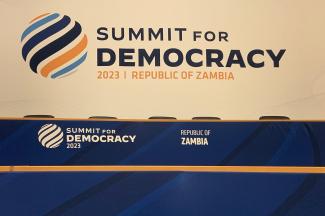
The second Summit for Democracy will be held in multiple locations, including Zambia.
USAID
Since the first Summit for Democracy in 2021, when Zambia joined other world leaders in pledging over 750 commitments, the country has demonstrated clear leadership in promoting respect for human rights and democratic governance — despite the threat of democratic backsliding. It also has a range of ongoing work to combat the pervasive forces of public and private corruption — making it a model for the region with a government that appears committed to democratic change.
Read on to hear from four civil society leaders in Zambia who are participating in the Summit and their democratic aspirations for their country.
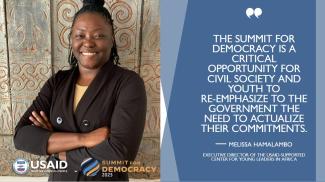
Melissa Hamalambo is the executive director of the USAID-supported Center for Young Leaders in Africa, which supports the advocacy for policy and legislative reform to ensure inclusive and meaningful youth participation in leadership at governance levels in Zambia. She was also a 2017 Young African Leaders Initiative alumni and a participant in the 2022 Obama Foundation Leaders Africa program.
USAID
Why are youth voices so important to democracy and what do they want from their government in Zambia?
It’s key to recognize the power of youth, especially as we trend in the majority — it’s impossible to ignore us, especially as we are more in touch with how to incorporate technology to embolden democracy. We seek integrity, courage, and truth from the government, and want a space that is inclusive and safe to participate, especially for women, that is based on merit, and we want the ability to apply our ideas to improve our communities.
The Summit for Democracy is a critical opportunity for civil society and youth to re-emphasize to the government the need to actualize their commitments — improving the rule of law, the electoral systems reforms, political inclusion, and guaranteeing the safety of the media — with a clear timeline and roadmap to ensure change before the next election.
We believe this is an ideal opportunity to work with our government leaders — we just need the right will and the right focus areas.
I remain inspired by the change I’ve seen in Zambia over the last three decades since I was a child — led by people who put their lives and livelihoods on the line so we can enjoy the benefits of their sacrifices. I believe together we will continue to achieve democratic progress in Zambia.
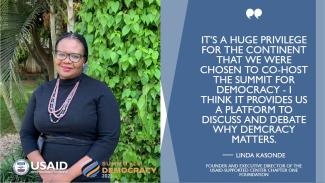
Linda Kasonde is the founder and executive director of the USAID-supported Chapter One Foundation, which promotes human rights defenders, constitutionalism, social justice, and the rule of law in Zambia through strategic litigation and advocacy. In 2019, she was elected vice-president for Africa of the Commonwealth Lawyers’ Association, the first Zambian woman to hold that position.
USAID
Why would you consider Zambia a “bright spot” in terms of democratic governance?
The trend in Zambia is that votes matter and people feel empowered to go to the ballot box — we are a beacon on the continent, and globally. In previous years the civil society space had shrunk, due to changes to the law and constitution. However, we are pushing back against democratic decline through new initiatives, such as increasing accountability and transparency of the Electoral Commission; replacing the Public Order Act with a more progressive Public Gathering Bill; and advocating for human rights in general.
It’s a huge privilege for the continent that we were chosen as a co-host for the Summit. It shows the confidence of the U.S. Government for democracy in Zambia. It also provides us with a platform to discuss and debate why democracy matters — and reaffirm to the world that democracy is the best form of government and the different roles stakeholders can play in bolstering democracy in their country.
This work is difficult — the victories are very big and the defeats are very punishing. But it’s incredibly satisfying that we are living in a freer society than before, and we played a role in making that happen.

Vusumuzi Sifile is a journalist and communication for development specialist currently serving as executive director at Panos Institute Southern Africa, part of the USAID-funded Open Spaces Zambia, which is working to strengthen the democratic foundations of freedom of expression, assembly and association, advancing digital literacy, as well as promoting independent and new media as conduits for strengthening democratic space in Zambia.
USAID
How vital do you think the free media is to democracy, especially in Zambia?
I believe that access to information is the oxygen of democracy — without it you cannot have a free media, and without free media you cannot have a thriving democracy. People need information about their rights and about the channels and systems that are in place to enjoy them.
In Zambia, our biggest limitation in the media space is the legal and policy environment. Unlike the other co-host countries of the Summit, we do not have an access to information law enacted by our parliament, and for more than two decades Zambia has been moving in circles and not enacting this law. This limits what journalists can cover or demand in terms of information on corruption or human rights issues. It also limits the ability of citizens to hold decision makers accountable.
Additionally, we have some laws that limit the extent to which investigative journalists can use digital tools to share information. These include the Cyber Security and Cyber Crimes Act, although the Zambian government has pledged to amend it, as part of its Summit commitments.
The fact that Zambia is co-hosting the Summit is a huge vote of confidence for our democracy. However, we want the Summit to be a platform where we see evidence-based updates from decision makers about the steps taken to fulfill the 2021 commitments — especially in regard to passing the access to information legislation as one of the steps to fulfilling the commitment on free media, which also will require a clear plan for implementation.
We also want to see new, timebound commitments to improve the media space, both online and offline. Until then, we — civil society and the media — will continue to speak with one voice and coordinate our efforts.
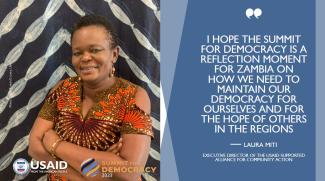
Laura Miti is the executive director of the USAID-supported Alliance for Community Action, which trained over 1,000 young people during the 2021 electoral cycle to engage on social media and to ask relevant questions of their elected leaders. She was recently appointed as a commissioner on the Zambian Human Rights Commission.
USAID
What is the history of free, fair, and transparent elections in Zambia?
I believe the citizenry of Zambia genuinely believes in democracy — they have also been witness since the restoration of democracy in 1991 [the first multi-party elections since 1968], to the transfer of government peacefully and democratically, even when the leader sought an additional term past the constitutional limit. However, in the five years before the last election in 2021, the government became oppressive and it appeared that citizens might be too scared to vote.
Though when the day came, I witnessed myself that the queues were 200–300 people long even in the middle of the night. This included the youth — the majority who were first time voters — and who ultimately determined the election through inspiring their peers on the importance of voting through social media advocacy.
The next election rides on this history.
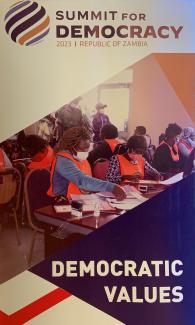
Zambia promotes the second Summit for Democracy in Lusaka March 29–30.
USAID
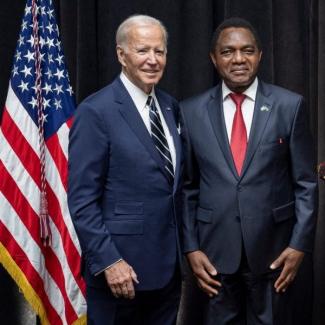
President Biden (left) with President Hichilema.
USAID
I hope the Summit for Democracy is a reflective moment for Zambia on how we need to maintain our democracy for ourselves and for the hope of others in the region.
Watch all of the second Summit for Democracy events via livestream here.
ABOUT THE AUTHOR
Jessica Benton Cooney is the Senior Communications and Outreach Specialist for USAID’s Center for Democracy, Human Rights, and Governance.

